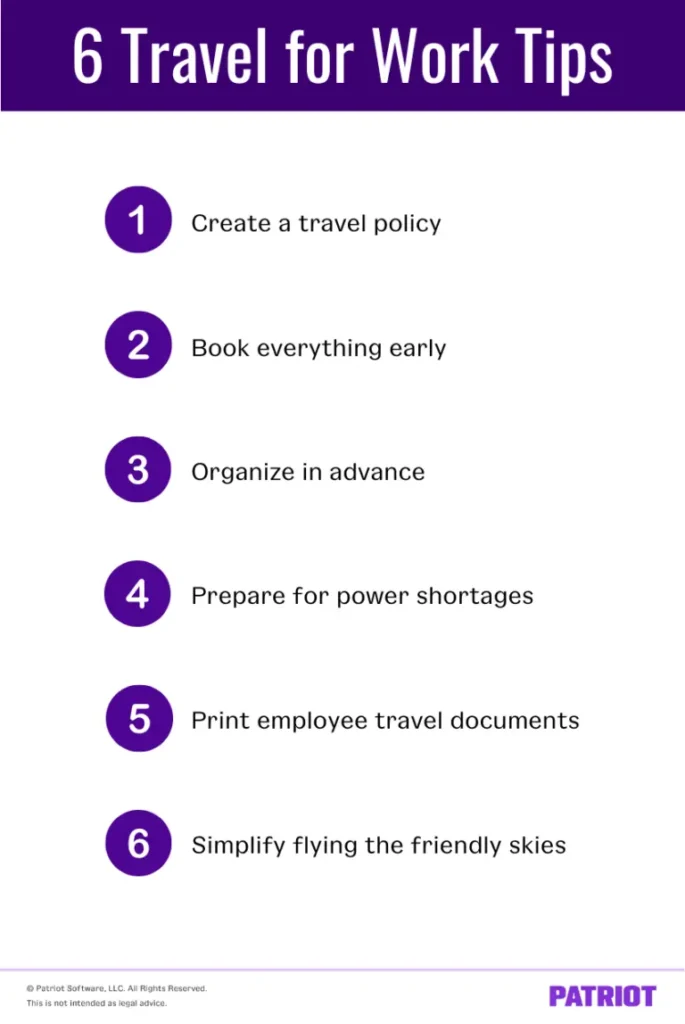As a business owner, traveling for work can be exciting. After all, what employee doesn’t like driving around town to meet daily business needs, or better yet, going to a new place and meeting new people? But, whether it’s in town or out of town, travel for work can also be time-consuming, complicated, and frustrating.
Read on to get the scoop on travel for work, including our list of six travel tips for work.
What is travel for work?
There are two types of travel for work: 1) travel which is a daily part of business, and 2) travel which occasionally takes employees out of town. Daily travel for work can look like a bookstore that offers local delivery to certain customers. When an employee makes a home delivery, this is technically travel for work. This type of travel for work is different from traveling to a conference in another city or going on an overnight trip to meet clients out of town.
Traveling during normal work hours is compensable work time, according to the Department of Labor. For instance, if the bookstore employee delivers books for six hours, they must be compensated for their time even though they are not technically in the store.
You should note that this does not include the time employees travel from home to work. Commuting from home to work isn’t considered compensated travel, even if the employee is in a vehicle you provided as their employer.
As an employer, you may also have to reimburse employees for the money they’ve spent while traveling.
Travel reimbursement
A travel reimbursement policy is when you reimburse employees for expenses they incur while traveling for work, whether in or out of town. The expenses covered depend on the policy.
Policies may cover things like:
- Airfare
- Car rental
- Car insurance
- Gasoline
- Lodging
- Meals
- Wear and tear of an employee’s vehicle
Make sure your employees read the fine print. There may be limits on prices for meals or hotel accommodations they can’t afford to miss.
Keep in mind that you may want to offer employees mileage reimbursement for the miles they’ve traveled in their cars. California, Illinois, and Massachusetts require employers to offer mileage reimbursement to their employees.
Deducting travel expenses for business
Employees (and self-employed individuals) can also deduct eligible travel expenses come tax time. To deduct travel expenses, make sure your employees keep their receipts and know what travel-related expenses are covered.
Deductible travel expenses can include:
- The costs of travel to the destination
- Lodging and non-entertainment-related meals
- Dry cleaning and laundry
- Tips for services related to any travel expenses (e.g., tipping a server or cab driver)
See IRS Publication 535 for more details.
6 Travel for work tips
No matter where your employees go, traveling for work can be a fun and enriching experience. But, that doesn’t mean that traveling for work is always easy, especially when it takes employees out of town. To make the next business-related trip a great experience, here are six travel tips for work for your employees.

1. Create a travel policy (if you don’t already have one)
Before anyone books anything, make sure your company has a firm travel policy. Travel policies can help make travel for work easier for you and your employees, save money, and promote safety when away from the office.
Travel policies may include:
- Approved travel companies
- Booking procedures
- Preferred company vendors
- Reimbursement processes
- Permitted and unpermitted expenses
- Approved travel insurance providers
So before you do anything, have a good travel policy in place. And if you feel the need to update it, make sure you keep everyone in the loop.
2. Book everything early
With travel, sometimes things can move quickly. If you want to avoid endless headaches, make sure to book things early for an employee’s next work trip. No matter the transportation, there are more choices if you book in advance.
Here are some perks of booking early:
- Cheaper costs for tickets and rentals than if you book last minute
- More options to choose from (e.g., seats on a plane or types of cars to rent)
- Less stress thanks to preparing from the get-go
3. Organize in advance
Being organized at work or home is one thing. If you lose something, chances are you’ll find it again soon. But when your employees travel for work, being organized is entirely different.
Travel organization can be as simple as good carry-on luggage or checked luggage with wheels (a must!). But, organization is just as essential once you reach your destination.
Here are some ways your employees can take travel organization to the next level:
- Create an email folder to store all electronic receipts, confirmations, and communications. Think of this folder as a catch-all for electronic information related to your employee’s business trip.
- Put receipts in the same place. Advise your employees to organize receipts on the go. That way, they have all of their receipts ready for reimbursement. For example, pocket-sized accordion folders are small enough to carry easily and can help employees organize receipts chronologically.
4. Prepare for power shortages
It’s easy to take for granted how often we have to plug in our devices to recharge. At home or the office, it’s second nature. When on the road, keeping the charge on devices can be extremely important. So, plan ahead.
You may offer employees who travel the equipment they need to prepare for power shortages, including:
- An extra cord for each device
- Power banks
5. Print out your employees’ travel documents
Sometimes, things go wrong. No one can afford lost or damaged devices when traveling for business. More often than not, a phone or laptop is an employee’s direct link to all the information they need. To avoid any issues for your team, print out all of your employees’ travel documents.
Here are some documents you may want to print out for your traveling employee(s):
- Confirmations for hotel rooms or car rentals
- Travel and business itinerary
- Important phone numbers
If the worst-case scenario becomes a reality, your employees have hard copies to help get to where they’re going.
6. Simplify flying the friendly skies
Everyone knows that the quickest way from point A to point B is to hop on an airplane and fly the friendly skies. But if you’ve ever been through an airport, you also know there are plenty of ways to make air travel as time-consuming as possible. If your employees are flying, help make the process as easy as possible.
If you’re booking the flight on their behalf, consider:
- Registering for TSA precheck. In July 2022, 95% of travelers who registered for TSA precheck waited less than five minutes. Some of the perks of TSA precheck include not having to take off shoes, belts, or light jackets when going through security.
- Booking nonstop flights. It may cost extra money, but nonstop flights can cut out the dreaded layover. If a layover is unavoidable, make sure it isn’t too short. You don’t want your employees to spend any part of their business-related travel running for their lives. Also, watch out for layovers that stretch on forever.
Are your employees often on the road for work? Patriot’s Full Service payroll has everything you need. Our time and attendance add-on lets employees easily log their hours no matter where they are. And, our HR add-on helps you manage all necessary documents online. See how easy payroll can be. Sign up for a free trial today!
This is not intended as legal advice; for more information, please click here.






